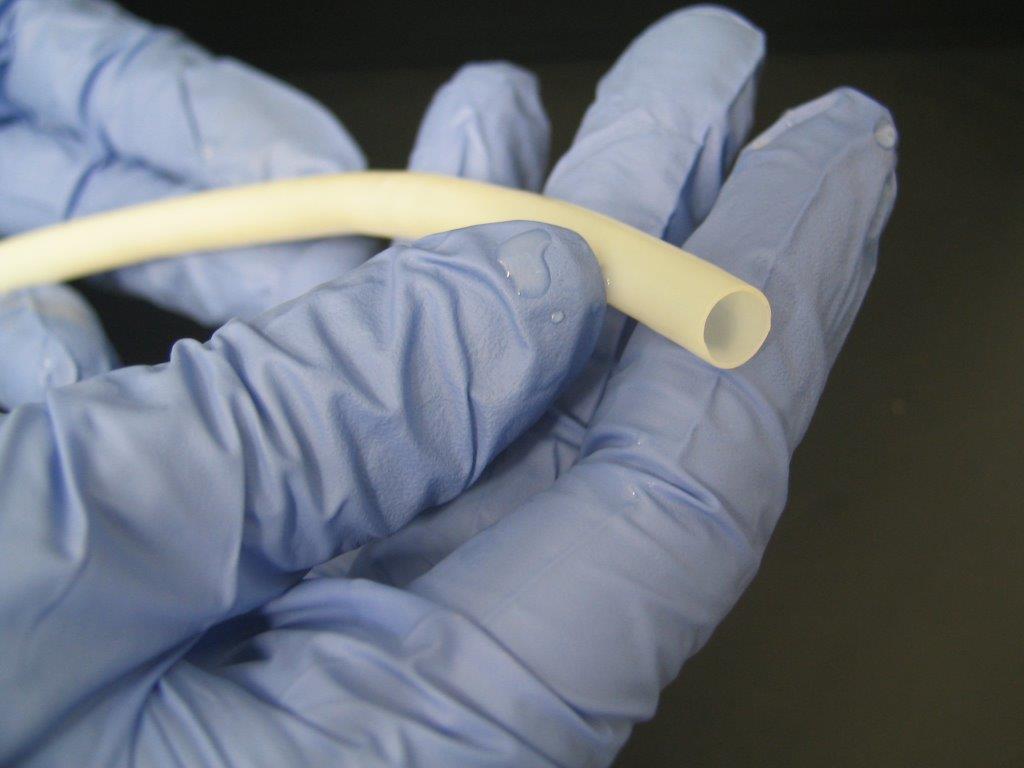
Humacyte Tabbed as ‘Technology Pioneer’ by World Economic Forum
By Barry Teater, NCBiotech Writer
 |
|
Sample of a Humacyl vessel. -- Humacyte photo |
Humacyte, a Morrisville-based regenerative medicine company, has been selected as one of the World Economic Forum’s 30 “Technology Pioneers” for 2017.
The honor is given to companies around the world that have new technologies and innovations poised to impact business and society. This year’s 30 Technology Pioneers are active in artificial intelligence, augmented reality, autonomous vehicles, biotechnology, blockchain, cybersecurity, the industrial internet of things and other revolutionary technologies.
“The brilliant minds, breakthrough technology and passionate team at Humacyte have led the company to this extraordinary recognition, and we are honored to be chosen by the World Economic Forum as a Technology Pioneer,” Carrie Cox, chairman and CEO of Humacyte, said in a news release.
Humacyte is a privately held medical research, discovery and development company founded by Laura Niklason, M.D., Ph.D., in 2004. Its clinical and pre-clinical investigational products have potential therapeutic applications across illnesses such as end-stage renal disease, repair or replacement of damaged arteries, coronary artery bypass surgery and vascular trauma.
Company supported early by NCBiotech loan
Humacyte received a $150,000 Small Business Research Loan from the North Carolina Biotechnology Center in 2006. In October 2015 it raised $150 million in a Series B preferred stock financing ̶ among the largest ever by a life science company in North Carolina.
In August 2016 Humacyte received a $9.9 million investment from the California Institute for Regenerative Medicine (CIRM) to support a phase 3 clinical trial of Humacyl in the treatment of kidney disease.
Unlike most regenerative medicine companies, Humacyte does not use a patient’s own cells as therapies or products. Instead, it uses a proprietary cell-culture technology to engineer human, extracellular matrix-based tissues that can be shaped into tubes, sheets, or particulate conformations, with properties similar to native tissues.
It is focused on creating “off-the-shelf,” or ready to use, bioengineered blood vessels that can be easily stored until doctors and patients need them. The blood vessels, branded as Humacyl, are being investigated clinically for patients undergoing kidney dialysis who require vascular access and for patients with peripheral arterial disease.
Humacyl is derived from human vascular cells that are seeded onto a degradable scaffold and then cultured so they secrete a matrix that forms a tissue in the shape of the scaffold. The vascular cells are then removed to avoid triggering an immune response in patients receiving the tissue.
Numerous regenerative medicine applications possible
The technology may be extended to a range of other vascular applications in the future, with the potential for better clinical outcomes and lower healthcare costs, the company said.
“Our vision is to make a meaningful impact in healthcare by advancing innovation in regenerative medicine to produce life-sustaining improvements for patients with vascular disease,” Cox said.
Following its selection as a Technology Pioneer, Humacyte will be honored during the World Economic Forum Annual Meeting of the New Champions, dubbed “Summer Davos,” to be held in Dalian, China, June 27 to 29. Many Pioneers will also attend the World Economic Forum’s annual meeting in Davos in January 2018 and continue to participate in dedicated Technology Pioneer community events during the next two years.
A selection committee of more than 60 academics, entrepreneurs, venture capitalists and corporate executives chose the Technology Pioneers. The committee based its decisions on criteria including innovation, potential impact and leadership.
Past recipients include Airbnb, Google, Kickstarter, Mozilla, Spotify, Twitter and Wikimedia.
